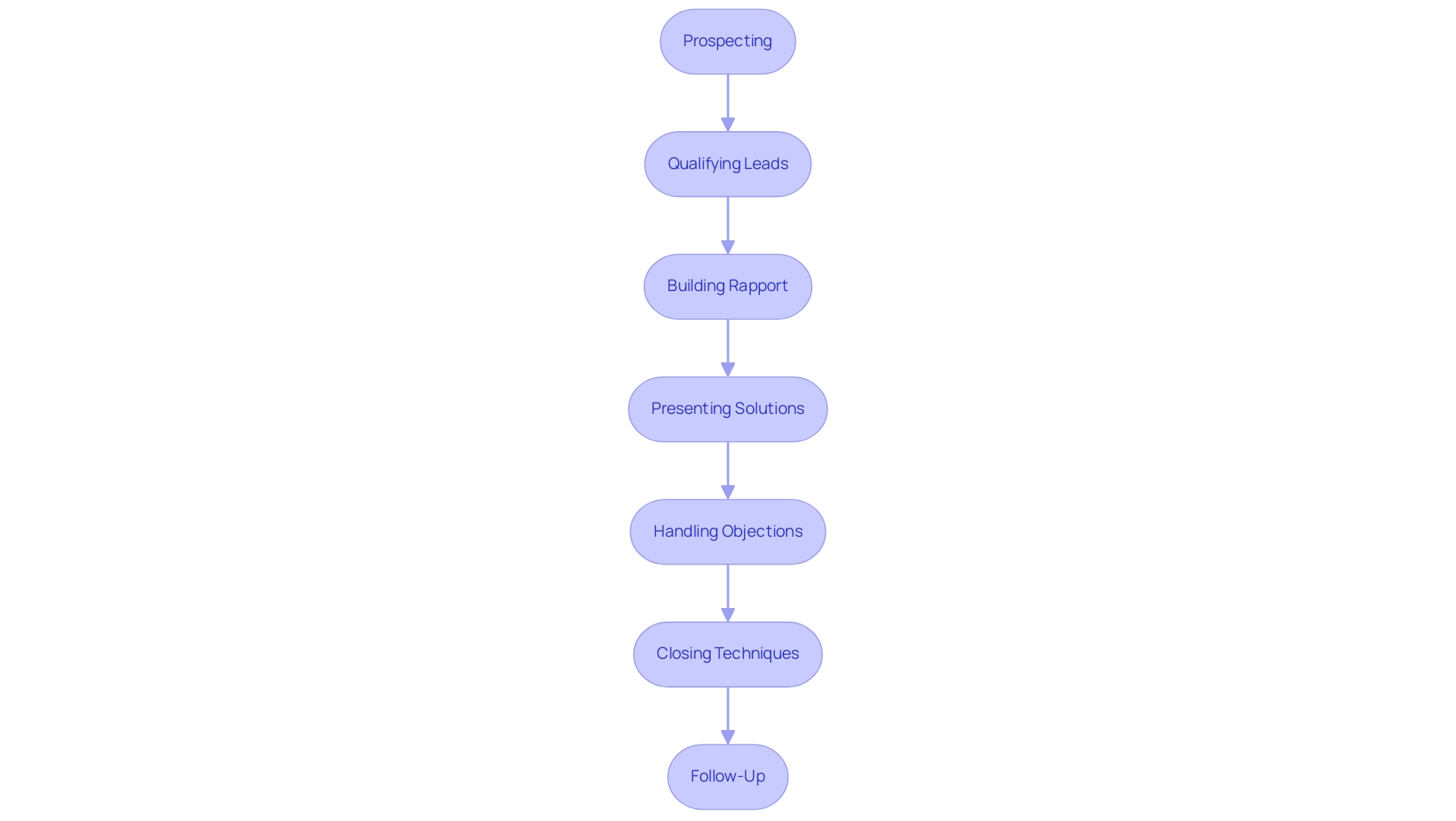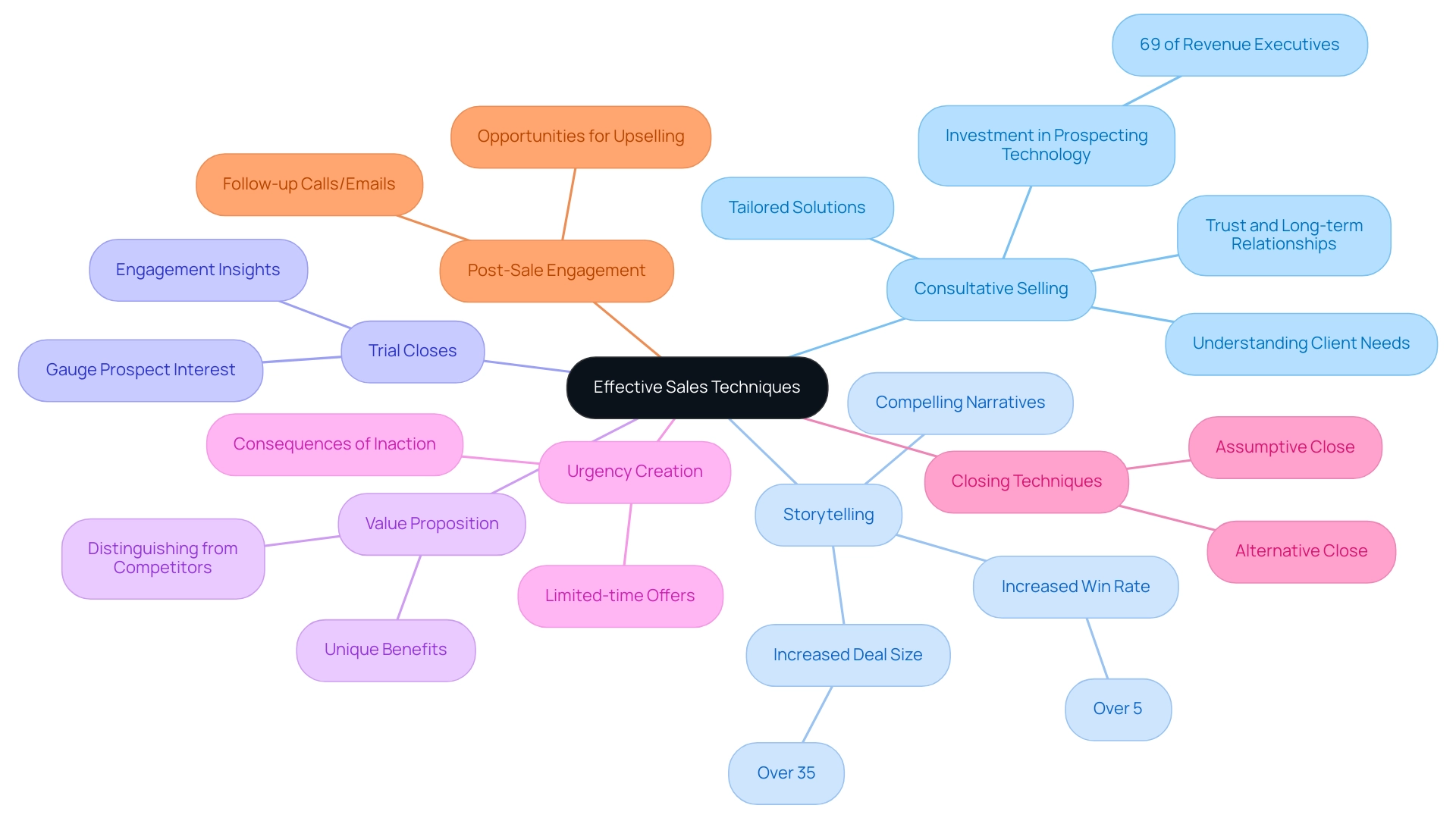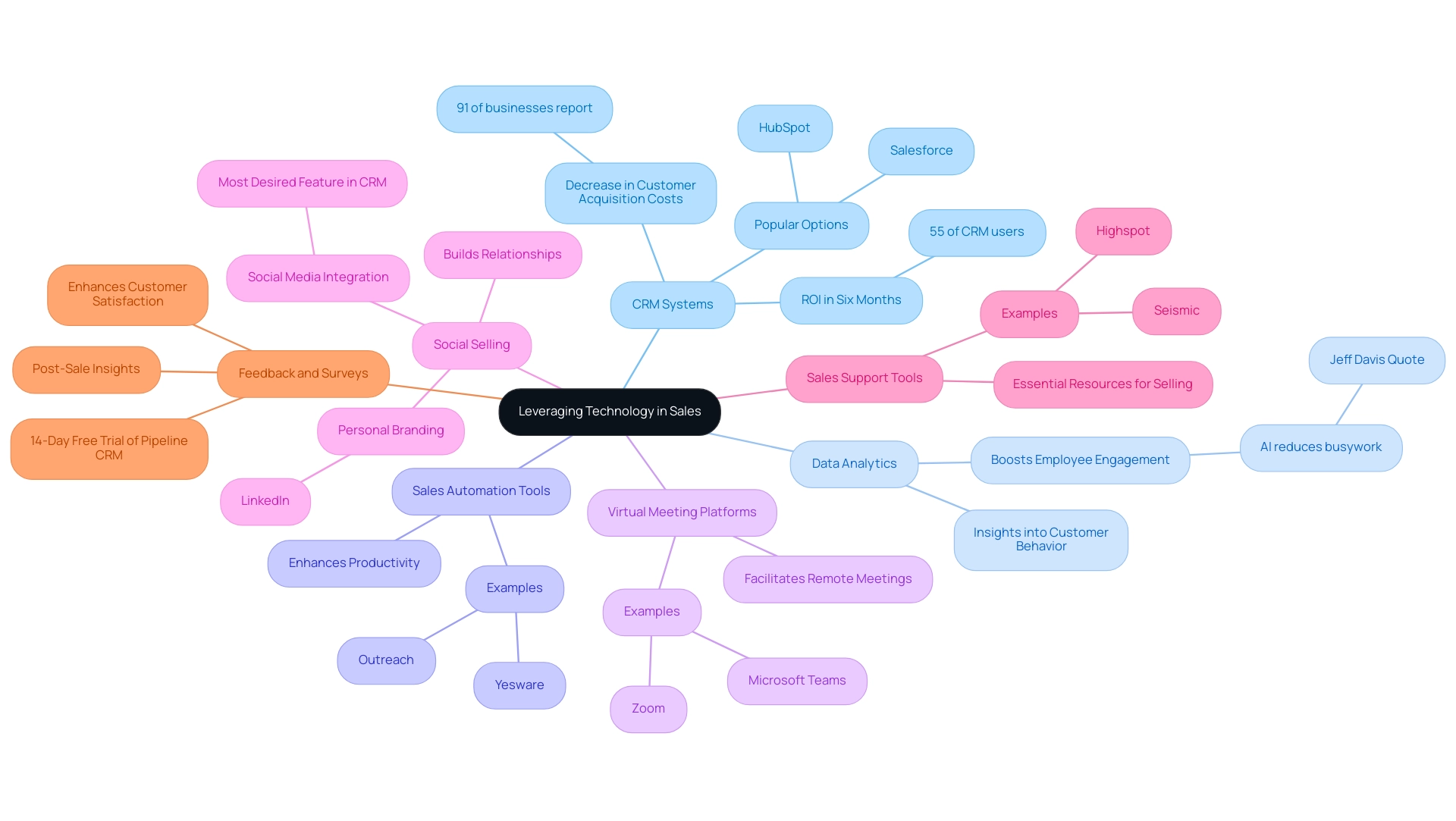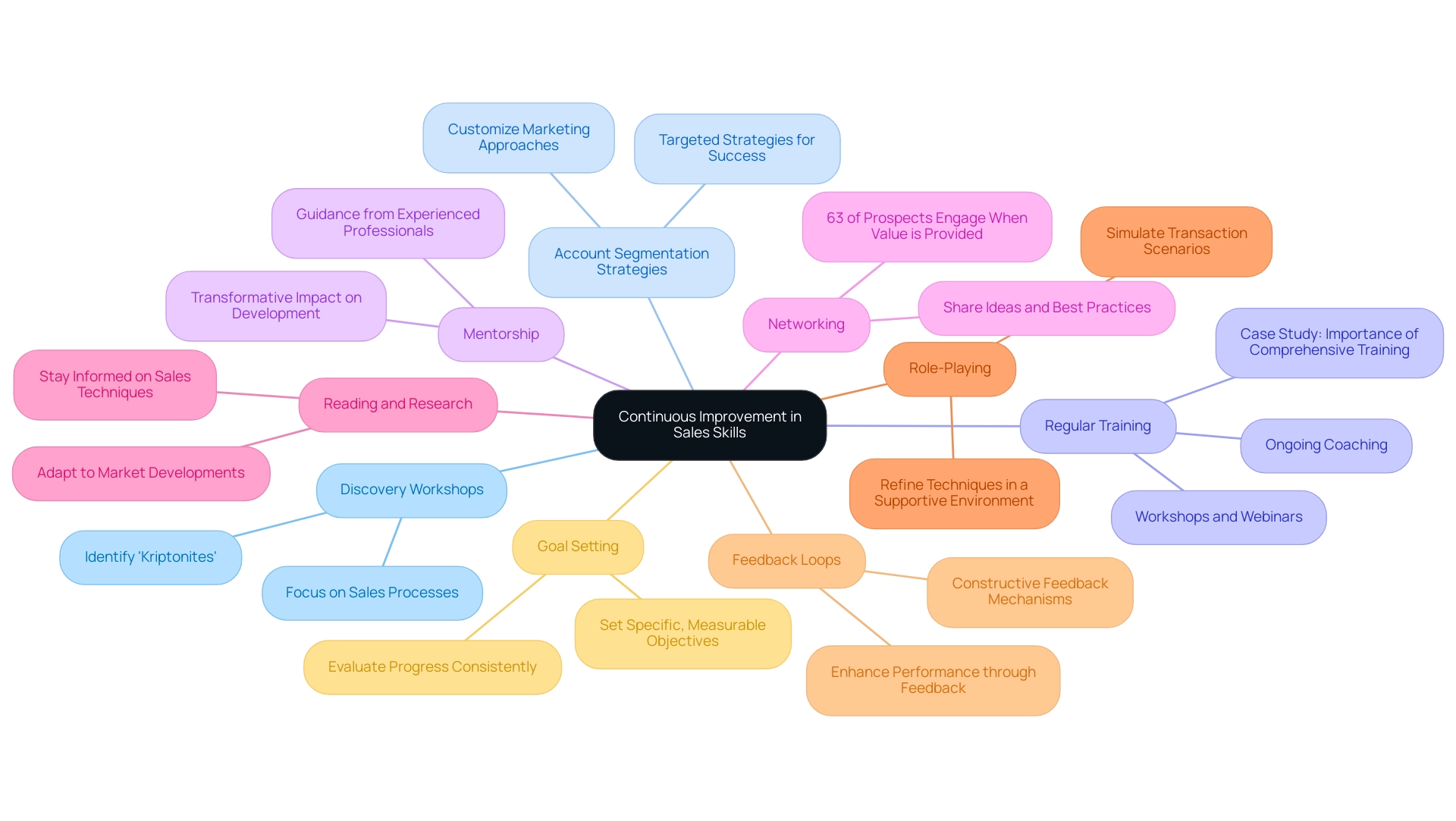Overview
To achieve a successful sale, one must follow a structured sales process that includes key elements such as prospecting, qualifying leads, building rapport, and effectively closing deals. The article outlines these steps and emphasizes the importance of utilizing technology and continuous improvement strategies to enhance sales effectiveness and cultivate long-term customer relationships.
Introduction
In the competitive landscape of sales, understanding the intricacies of the sales process is paramount for achieving success. This article delves into the essential components that drive effective sales strategies, from prospecting and qualifying leads to closing deals and maintaining client relationships.
It highlights the importance of leveraging technology and continuous improvement to enhance sales performance. By exploring proven techniques and innovative approaches, sales professionals can equip themselves with the tools necessary to navigate challenges and capitalize on opportunities, ultimately leading to sustained growth and success in their endeavors.
Understanding the Sales Process: Key Elements for Success
Achieving a successful sale necessitates a thorough understanding of the key elements of the sales process, which can significantly impact overall effectiveness. The following components are essential:
- Prospecting: Identifying potential customers is foundational and can be enhanced through diligent research and networking. Leveraging platforms such as LinkedIn and industry-specific directories can yield valuable leads.
- Qualifying Leads: Assessing the needs and potential of leads is critical to determine their suitability for your offerings. Employing the BANT criteria—Budget, Authority, Need, and Timeline—ensures that only the most promising leads are pursued.
- Building Rapport: Establishing a meaningful connection with prospects involves demonstrating genuine interest in their challenges and needs. Active listening plays a pivotal role in this stage, fostering trust and understanding.
- Presenting Solutions: Customizing your pitch to meet the specific requirements of the customer is vital. This involves articulating how your product or service can effectively address their pain points and enhance operations. As emphasized in consultative selling, it's crucial to sell the problem first and then present your solution, establishing credibility in your decision-making and risk mitigation capabilities. Furthermore, offering evidence during marketing discussions is crucial to strengthen credibility and trust.
- Handling Objections: Anticipating and addressing any concerns prospective clients may have is essential. Employ empathetic listening techniques and provide clear, concise responses to alleviate uncertainties. This training is enhanced by leveraging insights from successful case studies, showcasing non-standard and effective solutions drawn from over 20 years of experience.
- Closing Techniques: Employing effective closing techniques can encourage prospects to make a successful sale. Strategies may include summarizing the benefits, offering incentives, or instilling a sense of urgency.
- Follow-Up: Post-sale, it is crucial to maintain contact with customers to ensure satisfaction and to pave the way for future opportunities or referrals. High-performing business organizations are twice as likely to provide ongoing training, which is vital for achieving successful sales relationships. Challenges such as lack of time (27%), lack of resources (23%), and poor customer relationships (21%) can be addressed through consistent follow-up training.
The incorporation of artificial intelligence (AI) in selling processes has proven transformative, leading to an impressive 50% increase in revenue, including follow-up interactions. As noted, "Businesses utilizing artificial intelligence (AI) in their sales processes have experienced a remarkable 50% boost in their revenue, including follow-ups." Nevertheless, although adopting technology is vital, it should not jeopardize the cultivation of personal connections with customers—a balance important in addressing the obstacles encountered in the selling process.
Additionally, utilizing our 20+ years of expertise in the field enables us to provide distinct insights and approaches that improve the overall effectiveness.

Effective Sales Techniques: Strategies to Close the Deal
To effectively close deals and navigate the complexities of modern sales environments, it is essential to employ a variety of strategic sales techniques:
- Consultative Selling: This approach emphasizes understanding the client's needs and providing tailored solutions, fostering trust and cultivating long-term relationships. Sales experts note that adopting consultative techniques can significantly enhance closing rates, contributing to a more engaged client base. Moreover, recent data indicates that 69% of revenue executives intend to invest in prospecting technology, enhancing these approaches with greater understanding of client requirements.
- Storytelling: Compelling narratives illustrate the positive impacts of your product or service on other clients. Storytelling enhances memorability and relatability, making it a crucial element in contemporary presentations. Experts emphasize that using social selling can increase your win rate and deal size by over 5% and 35%, respectively, underscoring the effectiveness of personal narratives.
- Trial Closes: Throughout discussions, employing trial closes helps gauge the prospect's interest. Simple inquiries like "How does that sound so far?" provide insights into engagement levels and guide conversations toward successful conclusions.
- Value Proposition: Clearly articulating the unique benefits of your offering is vital. Positioning your product as a solution that adds value distinguishes it from competitors, facilitating relevance for prospects.
- Urgency Creation: Generating a sense of urgency is highly effective. Highlighting limited-time offers or potential consequences of inaction motivates quicker decisions.
- Closing Techniques: Various methods, including the assumptive close—where you act as though the prospect has already agreed to a successful sale—and the alternative close, which presents two choices, can be effective in achieving a successful sale.
- Post-Sale Engagement: Maintaining engagement post-sale is crucial. Follow-up calls or emails not only reinforce client decisions but also create opportunities for upselling or referrals, contributing to long-term success.
Additionally, incorporating the Heart of the Deal Method and the Problem Statement Method can provide structured approaches to deal creation and progression, enhancing the overall commercial strategy. Insights from the case study titled "Sales Group Management Strategies" emphasize the importance of empathy and quality over quantity in management. This approach focuses on booking meaningful meetings rather than merely increasing call volume, leading to better morale and improved outcomes.
To further improve your selling abilities, consider our Sales Gym membership, which provides customized frameworks, tips, and strategies aimed at elevating your selling and presales personnel. By integrating these innovative frameworks and understanding buyer competence, you can significantly enhance your effectiveness and drive improved outcomes for your team.

Leveraging Technology in Sales
To effectively utilize technology in commerce and enhance enterprise performance, consider the following approaches, supported by Pods Asia's MAGIC Sales Academy:
- Customer Relationship Management (CRM) Systems: Implementing a robust CRM system is essential for managing customer interactions, monitoring sales processes, and analyzing data. A significant 91% of businesses report a decrease in customer acquisition costs after adopting CRM, and 55% of CRM users see an ROI in six months or less. Popular options such as Salesforce and HubSpot can provide comprehensive solutions tailored to your organizational needs, complemented by ongoing training and support from the MAGIC Sales Academy.
- Data Analytics: Utilizing advanced data analytics tools allows for deep insights into customer behavior and preferences. This information is essential for guiding sales approaches and enhancing marketing efforts. As noted by Jeff Davis, Freshworks global survey shows AI putting a dent in busywork, boosting workers’ sense of purpose. The application of data analytics can thus not only enhance strategy but also improve overall employee engagement, aligning with our commitment to continuous learning.
- Sales Automation Tools: Automating repetitive tasks, such as follow-up emails and appointment scheduling, can significantly enhance productivity. Tools such as Outreach and Yesware simplify these tasks, allowing sales groups to concentrate on high-value activities that generate revenue, which is a key emphasis in our customized training programs.
- Virtual Meeting Platforms: Utilizing platforms such as Zoom or Microsoft Teams facilitates remote business meetings, providing greater flexibility and enabling connections with clients globally. This has become increasingly vital as businesses adapt to hybrid work environments, an area where our academy provides comprehensive support.
- Social Selling: Engaging with prospects through social media platforms fosters relationships and builds credibility. Creating a personal brand on platforms such as LinkedIn can draw leads and improve your outreach efforts. Significantly, the desire for social media integration is one of the most requested features in CRM, indicating its importance in contemporary marketing approaches. Many CRM tools are beginning to offer social integration features to attract new prospects, a topic we cover in our tailored sessions.
- Sales Support Tools: Providing your selling group with the appropriate resources and training materials is crucial for effective selling. Tools like Seismic and Highspot provide essential assistance, allowing groups to obtain the information necessary to finalize agreements effectively, which aligns with our dedication to improving selling abilities and approaches through continuous learning.
- Feedback and Surveys: Implementing feedback mechanisms post-sale helps gather insights from customers. Using these insights to enhance marketing approaches can result in better customer satisfaction and lasting loyalty. With a 14-day free trial of Pipeline CRM accessible for new users, organizations have a chance to explore these advantages firsthand, backed by our extensive sales skill monitoring and improvement services.
In summary, incorporating these technological approaches into your sales framework, bolstered by Pods Asia's MAGIC Sales Academy, can significantly boost performance and productivity, ensuring your sales personnel are well-prepared to meet the demands of the changing market landscape. For just $150/month, members gain access to deep dive audio podcast sessions, tailored topic requests, three consultation sessions per month, and priority support. For further inquiries, please refer to our FAQs for more details on our offerings.

Continuous Improvement in Sales Skills
To cultivate a culture of continuous improvement in sales skills, it is essential to adopt a structured approach incorporating various effective strategies:
- Discovery Workshops: Participate in intensive two-day workshops aimed at identifying 'kriptonites' within your selling and presales teams. These workshops concentrate on comprehending sales processes, value expression, and key differentiators, which are essential for improving performance and doubling productivity.
- Account Segmentation Strategies: Customize your marketing approaches based on account characteristics rather than relying solely on verticals or client size. By categorizing accounts based on the particular approaches required to succeed, marketing teams can double their productivity. This method allows for a more targeted approach, ensuring that each account receives the appropriate attention and strategy for a successful sale.
- Regular Training: Engage in workshops, webinars, and training sessions to remain informed about the latest selling techniques and industry trends. Research indicates that comprehensive training is crucial, as it significantly boosts productivity and equips teams to secure a successful sale. For instance, a case study titled 'Importance of Comprehensive Training for Sales Personnel' emphasizes that ongoing coaching and refresher programs are essential for developing new representatives into top performers.
- Mentorship: Engage with experienced professionals who can provide guidance. Their guidance, rooted in real-world experience, can provide invaluable insights that foster skill development. Incorporating mentorship programs can lead to enhanced performance, as supported by expert opinions on the transformative impact of mentorship in development.
- Networking: Actively network with peers in the industry to share ideas and best practices. This exchange can lead to new opportunities and collaborations that improve overall revenue effectiveness. A recent study reveals that prospects are more likely to engage with salespeople who demonstrate a clear understanding of their needs, making networking a strategic necessity. In fact, 63% of prospects are likely to engage if the agent provides something of value, highlighting the significance of networking in establishing that value.
- Reading and Research: Dedicate time to read books, articles, and case studies focused on sales techniques and market developments. Staying informed enables professionals to adapt their approaches and remain competitive in an ever-evolving landscape.
- Role-Playing: Implement role-playing exercises with colleagues to simulate transaction scenarios. This practice can sharpen skills and bolster confidence, allowing team members to refine their techniques in a supportive environment.
- Feedback Loops: Establish mechanisms for receiving constructive feedback on sales techniques. Consistent feedback from colleagues and mentors aids in modifications and enhancements, ultimately resulting in improved performance. As mentioned previously, 63% of prospects are more inclined to engage when representatives offer something of value, highlighting the importance of effective feedback in accomplishing this.
- Goal Setting: Set specific, measurable objectives for performance. Consistently evaluate progress toward these objectives to pinpoint areas for enhancement, ensuring that the sales group remains focused and motivated.
Adopting these strategies not only aids in the growth of individual professionals but also cultivates a high-performing team that can effectively achieve a successful sale by addressing the needs of potential clients. This commitment to growth is essential in achieving sales success.

Conclusion
Understanding the sales process is not just beneficial; it is essential for driving success in a competitive market. By focusing on key elements such as:
- Prospecting
- Qualifying leads
- Building rapport
sales professionals can create a solid foundation for effective sales strategies. Tailoring presentations to address client needs and managing objections with empathy further enhance the likelihood of closing deals.
The integration of technology, particularly through CRM systems and data analytics, has transformed the sales landscape, enabling teams to optimize their efforts and enhance productivity. Continuous improvement through regular training, mentorship, and networking ensures that sales professionals remain adaptable and competitive. These practices not only foster individual growth but also contribute to the overall performance of the sales team.
Ultimately, leveraging proven techniques alongside innovative approaches equips sales professionals with the necessary tools to navigate challenges and seize opportunities. By committing to a culture of continuous improvement and embracing technology, sales teams can achieve sustained growth and success in their endeavors. The journey toward mastering the sales process is ongoing, but with the right strategies and mindset, it can lead to remarkable results.
Frequently Asked Questions
What are the key elements of the sales process?
The key elements of the sales process include prospecting, qualifying leads, building rapport, presenting solutions, handling objections, closing techniques, and follow-up.
How can I identify potential customers during the prospecting phase?
Potential customers can be identified through diligent research and networking, utilizing platforms like LinkedIn and industry-specific directories.
What is the purpose of qualifying leads?
Qualifying leads helps assess their needs and potential, ensuring that only the most promising leads are pursued. The BANT criteria—Budget, Authority, Need, and Timeline—can be employed for this assessment.
Why is building rapport important in the sales process?
Building rapport is crucial as it establishes a meaningful connection with prospects, demonstrating genuine interest in their challenges and needs, which fosters trust and understanding.
How should I present solutions to prospects?
Solutions should be customized to meet the specific requirements of the customer, articulating how your product or service addresses their pain points. It's important to sell the problem first and then present your solution, while providing evidence to strengthen credibility.
What techniques can I use to handle objections from prospects?
To handle objections, employ empathetic listening techniques and provide clear, concise responses. Leveraging insights from successful case studies can also help alleviate uncertainties.
What are effective closing techniques in sales?
Effective closing techniques may include summarizing the benefits, offering incentives, or instilling a sense of urgency to encourage prospects to make a purchase.
Why is follow-up important after a sale?
Follow-up is crucial to maintain contact with customers, ensure satisfaction, and pave the way for future opportunities or referrals. Ongoing training is also important for developing successful sales relationships.
How has artificial intelligence (AI) impacted sales processes?
The incorporation of AI in sales processes has led to a 50% increase in revenue, including follow-up interactions, while helping to maintain personal connections with customers.
How can 20+ years of expertise enhance the sales process?
Utilizing 20+ years of expertise provides distinct insights and approaches that improve overall effectiveness in the sales process.




